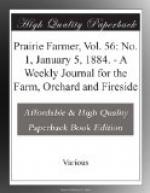regulation of commerce between the States.
This implies a power to destroy a contagious disease
which if allowed to spread would arrest all commerce
in bovines between the States. A State may and
ought to waive the question of damage if it is
fixed by a neutral Commissioner, and the General
Government and not the State meets the losses
to which unfortunate cattle owners maybe subject.
This will be the touchstone—trust by the
State and statesmanlike generosity by the Nation—that
means courage for the now fearful ranchman of
the unfenced domain, and the furnishing of a “clean
bill of health” for our products seeking
a foreign market. Having evinced zeal in doing
justice, it can ask for justice—that the
rights of our meat-producers be respected under
our
COMMERCIAL TREATIES.
Commerce means a mutual exchange, and having performed our home duty will be in no mood to tolerate a whim or a caprice. Non-intercourse has been proposed in Congress. That may be a final resort when a conference, practical discussion, and even arbitration have failed. A graver subject measured by dollars may yet engage the statesman diplomat than the Geneva arbitration, and we shall have no fair status in discussion or arbitration until our meat and cattle are made healthy by prevention and the best sanitary laws known to civilized countries.
THE TIME IS AUSPICIOUS.
Cattle-raising as an attractive and profitable vocation is now exciting a deep interest. A lull in politics forbids the wants of our agriculturists, numbering 60 per cent of the population, being waived out of notice and their voiced demands drowned by partisan clamor. The treasury has hundreds of millions in its vaults and a fraction of 1 per cent of our surplus will only be required, under a just disbursement, to isolate and destroy the diseases which fetter our commerce and repress home enterprise.
A full and able convention at Washington is assured by the responsive letters received. The State of Iowa will make her requests to Congress by fine-stock meeting and other associations, as becomes the State with $100,000,000 invested in domestic animals.
Who can be indifferent in the face of our great perils, and recounting the losses by foreign restrictions and inhibition? We are emphatically a Nation of beef-eaters, and by the extent of our domain and healthful climate are justly entitled to the honored designation of the first producer among civilized nations.
It is the question of healthful food for the masses, of profitable tonnage for the railways, and of deep concern in cultivating fraternal relations abroad, not less than a question for the political economist in maintaining a good trade balance-sheet. If we can impress our Congressional delegations with the necessity of early and decisive legislation, we shall have accomplished a noble work and have earned the warm commendation of millions of citizens whose interests have been neglected and whose vocation and property have been imperiled.
For the committee by request of the Chicago Convention.




